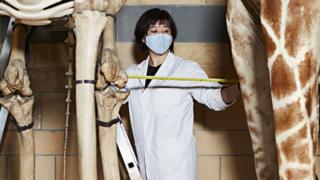This website uses cookies so that we can provide you with the best user experience possible. Cookie information is stored in your browser and performs functions such as recognising you when you return to our website and helping our team to understand which sections of the website you find most interesting and useful.
 Image copyright Natural History Museum
Image copyright Natural History MuseumSome of London's biggest museums have announced their plans to reopen next month, but are expecting visitor numbers to drop by 80% when they do.
The Natural History Museum, V&A and Science Museum will all open their doors again during August.
Visitors will be "strongly" recommended to wear face masks, but it will not be compulsory, as it will in shops.
Free tickets must be booked in advance. The venues ruled out charging, despite their "very precarious" finances.
The museums all have their main bases in South Kensington and will reopen before the end of the school summer holidays:
- Natural History Museum - 5 August, Wednesday-Sunday, with the "vast majority" of galleries open. The branch in Tring, Hertfordshire, will reopen on the same day.
- V&A - ground and lower ground floors from 6 August, open Thursday-Sunday; then first and second floors, and the V&A Dundee, from 27 August.
- Science Museum - 19 August, seven days a week until 6 September, then Wednesday-Sunday. Reopening dates vary for the four other attractions in the Science Museum Group.
Natural History Museum director Sir Michael Dixon said its visitor numbers would initially be capped at 2,800 per day.
"But that's about a fifth of our normal average attendance," he said. "We're expecting something like an 80% reduction until social distancing rules change, and the public attitudes to visiting change.
"We think that demand will outstrip supply, but that's a guess because we're in a period of mass uncertainty at the moment."
The V&A is expecting a reduction "in the same ballpark", director Tristram Hunt said, explaining that it would open for fewer days than normal at first.
"Our finances have been bolstered by the government but are still very precarious, so there's little point having very extended opening hours if no-one's coming through the door," he said.
The museum bosses praised the government for its £1.5bn emergency funding package, but said they would need more money next year to make up for fewer people buying from their cafes and shops.
Hunt said there would need to be "a new partnership with government which recognises this new reality, which understands that in the absence of the commercial income that comes from those visitors we will need more government support going into the future".
The funding announced by the government earlier this month was "resoundingly good", according to Sir Ian Blatchford, director of the Science Museum Group and chair of the National Museum Directors' Council.
"It's the type of thing you'd expect the German or the French government to spend," he said.
'A retrograde step'
"The big issue for us is next year - the [next] full financial year - there'll be a discussion with the government this autumn."
But he said charging for entry to make up the financial shortfall was "definitely not on the agenda", beyond special exhibitions.
"It seems to me absolutely the worst possible policy. There's no support for entrance fees from any major political party.
"As far as I'm concerned, that debate is dead, buried and covered in concrete because at a time when we're trying to increase the diversity of our audiences, I think charging people to go to museums would be a retrograde step of absolutely the worst sort.
"If the government introduced it, I would resign."
Follow us on Facebook, or on Twitter @BBCNewsEnts. If you have a story suggestion email entertainment.news@bbc.co.uk.



 Africana55 Radio
Africana55 Radio 
